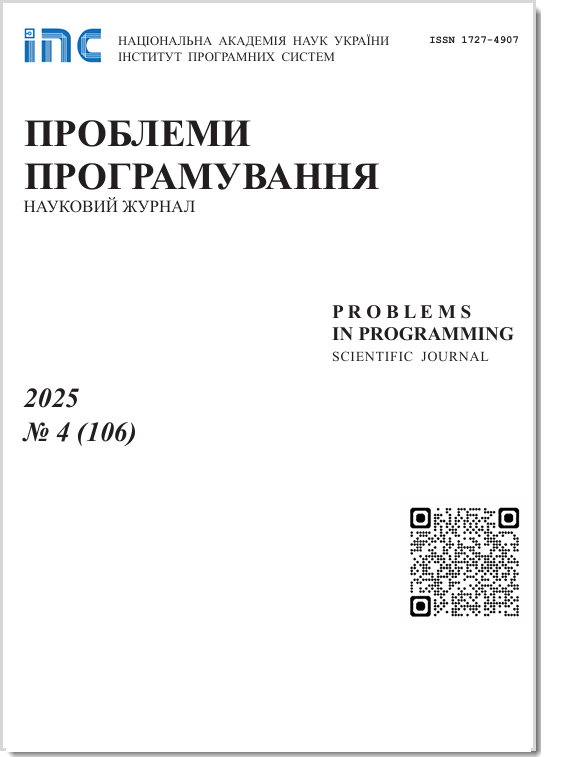Principles and models of expert-analytical methodology for adaptive organizational decisions forming under deep uncertainty
Abstract
The paper depicts and analyzes Expert-Analytical Methodology named EAM DMDU to support Proactive Anti-crisis Decisions within Organizational Systems under deep uncertainty. Complex tools are proposed for Decisions Domain Knowledge analytical operation. The Benefit is no essential resource demands while keeping the basic principles to deal with deep uncertainty (uncertainties and inconsisten- cies eliciting; Decision vulnerabilities searching instead prediction; threats resilience priority over effectiveness).
EAM DMDU enables Deliberative multi-staged Process for Adaptive Decision forming aimed at expected future conflict situation solving. The Process stages are: Problem situation Analysis, Impact on Problem Situation Goal Proposition, Goal proposals Assessment; Efforts for Goal achieving Proposals; Effort Proposals Assessment; reference Proposal option Selection and Decision adaptations accordingly to Decision Frame changes Recommendation. Knowledge operation is enabled with the procedures such as: formal analysis, individual expert assessment, Decision elements deliberative forming. EAM DMDU common information space of is based on Domain Ontology and ensures equal participants’ awareness, expert judgments with their arguments constructive representation and knowledge reuse. Expert-analytical Selection of Proposals uses their Perspectivity Model. It is a sub-goals hierarchy to achieve the goal being formed over previous Process stages. Hierarchy knot is represented with ontologically formalized definition for State of the Art corresponding sub-goal achievement. Leaf node depicts State of the Art with explicit expert Estimates of Certainty factor (from the Stanford model) being provided concerning its implementation through Decision element Proposal being assessed. The Estimate’s arguments are elements of information space used by expert. Under incomplete certainty of element expert provides its boundary values and State of the Art estimates both pessimistic and optimistic. Perspectivity Model contains also conditions for goal achievement violation being caused with environmental threats. Procedures for Estimates formal integration up to Model provide extreme estimates of Proposals Perspectivity and Robustness regarding current uncertainty. Under unsatisfactory properties of integrated Estimates their deliberative adjustment is carried out using Uncertainty Map and arguments provided. The final reference Decision contains selected Goal-Means option and guides to adapt it when decision frame changes. Further research is carried out for EAM DMDU instrumental tools development and its usage for defense resource management.
Prombles in programming 2022; 3-4: 364-375
Keywords
Full Text:
PDF (Українська)References
Marchau, V.A., Walker, W.E., Popper, S.V. (2019) Decision Making Under Deep Uncertainty. From Theory to Practice. Springer. - 408 p.CrossRef
Taleb, N.N. (2018) The Black Swan: The Impact of the Highly Improbable. Kolibri, Moscow, Russia. - 735 p. (in Russian).
Lempert, R.J. Popper, S.V., Groves, D.G. Making Good Decisions Without Predictions: Robust Decision Making for Planning Under Deep Uncertainty. CA: RAND, RB-9701. Santa Monica, 2013. [Electronic resource]. - Mode of access: https://www.rand.org/content/dam/rand/ pubs/research_briefs/RB9700/RB9701/RAND_RB9701.pdf.
Kwakkel, J.H., Walker W.E., Marchau, V.A. Adaptive airport strategic planning. In: Europ. J. of Transport and Infrastructure Research. - 2010. - V.10 - N3 - P. 249 - 273.
Haasnoot, M., Kwakkel, J.H., Walker W.E., terMaat, J. (2013) Dynamic adaptive policy pathways: A method for crafting robust decisions for a deeply uncertain world. In: Global Environmental Change. - V.23. - N2 - P. 485-498. CrossRef
What is a DeliberativeProcess? [Electronic resource]. - Mode of access: https://www.ncchpp.ca/docs/DeliberativeDoc1_EN_pdf.pdf
Renn, O. (2004) The challenge of integrating deliberation and expertise. Risk analysis and society: In: An interdisciplinary characterisation of the field. - P.289-366. CrossRef
Zenko, M. (2015) Red Team: How to succeed by thinking like the enemy. Basic Books. - 336 p.
The Applied Critical Thinking Handbook. V.7.0 (2015) University of Foreign Military and Cultural Studies. - 250 p.
Ilina, E.P. (2016) Methods and Models for Employment of the Expert Analytical Knowledge in Organization Decision Making. Part I. Deci- sions Knowledge Models. In: Problems in Programming. - N 1. - P. 89-101. [In Russian] . CrossRef
Heckerman, D. The Certainty-Factor Model. [Electronic resource]. - Mode of access:http://heckerman.com/david/H92encyclopedia.pdf.
Torgo, L. Rule Combination in Inductive Learning. [Electronic resource]. - Mode of access: https://www.dcc.fc.up.pt/~ltorgo/Papers/ RCIL/RCIL.html.
Ilina, E.P. (2009) The Functions and the Methods for the modern paradigms of the Delphi method support. In: Problems in Programming. - N 1. - P. 36-52. [In Russian].
Sinitsyn I.P., Ilina E.P., Slabospitskaya, O.A., Yablokova, T.L. (2011) Computer Support of decision making in the fundamental scien-tific research programs management using the expert methodology. Preprint. Kiev. Software Systems Institute of NAS of Ukraine - 94 p.[In Russian].
Sinitsyn, I.P., Ilina, E.P. (2017) Models and methods for automated analytic support of the organization decisions field. In: Problems in Programming. - N 3. - P. 93-107. [In Russian].
Havrylyuk, I.Yu., Stepanyuk, M.Yu., Sinitsyn, I.P., Kotelya, O.V. About NATO Logistics System implementation in Ukraine. [Electronic resource]. - Mode of access: http://defpol.org.ua/index.php/aleia-heroiv/481-shchodo-vprovadzhennya-lohistychnoyi-systemy-nato-v- ukrayini. [in Ukrainian].
DOI: https://doi.org/10.15407/pp2022.03-04.364
Refbacks
- There are currently no refbacks.









